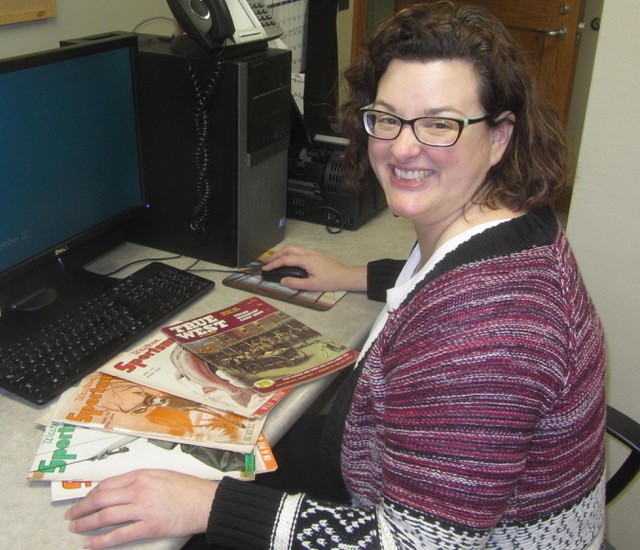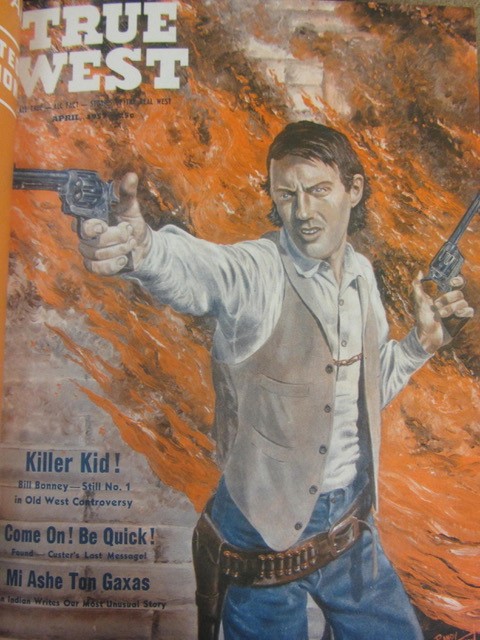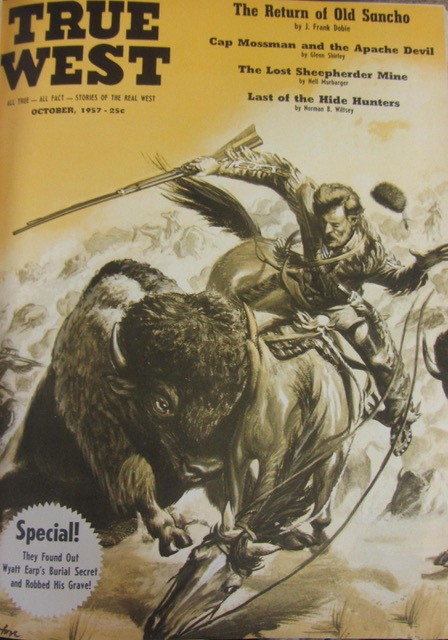Sandoz Center acquires 'True West' archives

CHADRON – A treasure trove of stories about Western history told by the people who lived it has become part of the collection at the Mari Sandoz High Plains Heritage Center at Chadron State College, thanks to a donation from the family of the Texas man who founded, wrote and published “True West” magazine.
The Joe Austell Small collection, which includes bound volumes of “True West,” “Old West,” “Western Sportsman,” “Frontier Times,” and other publications, was given to the Sandoz Center this fall by Small’s nephew, Ralph McCalmont, said Sarah Polak, director of the Sandoz Center. The collection includes magazines from the mid-1930s through the 1970s.
McCalmont said Small was a colorful character, who began his writing career as a teenager in the 1930s. Small was friends with many noted Western historians and writers and he thought too much history was written in the language of academics.
“Western history and cattle history was the love of his life,” McCalmont said. “Uncle Joe wrote it in the language of the people that lived it.”
Small and his wife, Elizabeth, started their publishing ventures during World War II by purchasing “Western Sportsman,” a magazine focused on hunting and fishing in the American West and made it into the first financially successful regional outdoor magazine.
They started “True West,” the best known of their publications, in 1953, and filled it with stories about gunfighters and lawmen, vigilantes, Indian battles, boom towns and topics related to the history of the American West. The popularity of television Westerns in the late 1950s and early 1960s helped boost the magazine’s circulation and Small became a prominent figure in the publication and writing of Western Americana, according to the Texas State Historical Society.
Small was aided in his goal of conveying historical facts in an entertaining manner by several noted writers of the period, including Walter Prescott Webb, chairman of the history department at the University of Texas, J. Frank Dobie, a Texas folklorist and historian, and Fredrick Gipson, author of “Old Yeller.”
Those men were friends with Small and would get together with him at his lakeside cabin to fish, play poker, drink whiskey and tell stories, said McCalmont.
“Everybody loved him … He would spin yarns. He had a way of telling them,” McCalmont said.
Small was conscious of the need for accuracy in his publications and had historians review the materials, but favored stories written in the authentic voice of people with firsthand experience. “He objected to the history of the west not being told in the right language,” McCalmont said. “I would call (‘True West’) a colorful presentation of history.”
Though the veracity of some of the articles in the magazine may not hold up under scrutiny, they can still be valuable for historical research about how the myths got started, Polak said. “There’s always a bit of truth in (the stories),” she said.
The hunting and fishing stories in the “Sportsman” magazines, which date from the 1930s through the mid-50s, are also valuable for researchers interested in details about wildlife in that period, Polak said.
Small eventually sold “True West” and his publishing company due to declining health and a dwindling market, but after several moves and ownership changes, the magazine has enjoyed a revival under owner Bob Boze Bell and has an active internet presence. A number of Nebraska places have been recognized in its annual Best of the West listings, including the Olde Main Street Inn in Chadron as one of the best historic western hotels.
Joe Small died in 1994 after a lengthy illness. McCalmont acquired his set of the magazine archives following Elizabeth Small’s death in 2006. Another set is at the University of Texas, Austin, and one set remains with a family member, he said.
McCalmont became familiar with Chadron State College through his friendship with former CSC Dean Don Green, and has visited the campus several times. He was looking for a place where the magazine archives would be made available to writers and researchers, and said that Green suggested the Sandoz Center.
The Small collection fits well with Mari Sandoz archives, the Coffee and Richards family materials, and the extensive oral history collection at the Sandoz Center and C.F. Coffee Gallery, said Polak.
“A lot of those stories aren’t published anywhere else,” she said. “It will really round out the story we have here.”
Items from the Small collection will not be checked out, but students and visitors are welcome to read them in the research room and some of the materials will likely be used in displays and traveling exhibits, said Polak.
“We are really excited to have them. It is a sizable collection. There is a ton of material that is so hard to find for people who truly love Western history and want to hear about it from the people who lived it,” she said.
Related story: Ag students introduced to area's ranching history
Category: Campus News


